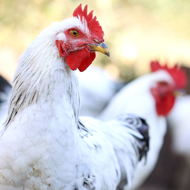
Poultry producers urged to remain vigilant
Indirect contact with wild birds is thought to be the most likely cause of an outbreak of avian influenza reported at a farm in Scotland earlier this year.
Laboratory tests confirmed a very mild form of H5N1 avian influenza at a premises near Dunfermline in January.
Over 40,000 birds were culled and a one kilometre restriction was put in place around the poultry farm for 21 days after preliminary cleansing and disinfection.
Now an epidemiology report published by the Animal and Plant Health Agency has concluded that the most likely source of the outbreak was indirect contact with wild birds.
Speaking to BBC News, Sheila Voas, Scotland's chief veterinary officer, said: "Investigations have concluded that indirect contact with wild birds is the most likely source of the case of very mild avian influenza near Dunfermline.
"Tests also found it was a different strain of H5N1 to those previously seen on the continent.
"We know that infections such as this constantly circulate in wild bird populations at a very low level and therefore remain a constant, low-level threat to poultry in Scotland.
"That is why I am writing to all registered poultry keepers in Scotland with advice about how to maintain good biosecurity on their farm."
The Scottish Government say that the likelihood of the disease spreading to other parts of the UK is very low, but poultry producers are advised to remain vigilant.
There have been no other cases of H5N1 identified to date in domestic poultry in the UK despite raised awareness following confirmation of disease and the recent H7N7 outbreak.



 The Veterinary Medicines Directorate (VMD) is inviting applications from veterinary students to attend a one-week extramural studies (EMS) placement in July 2026.
The Veterinary Medicines Directorate (VMD) is inviting applications from veterinary students to attend a one-week extramural studies (EMS) placement in July 2026.